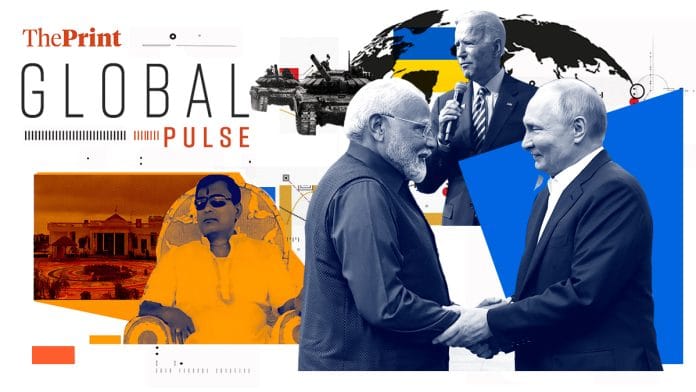New Delhi: Prime Minister Narendra Modi’s Moscow visit signals India’s resolution to carve out its foreign policy path despite the West’s pressure to condemn Russia over the Ukraine war, The New York Times correspondents Anupreeta Das and Hari Kumar report.
The report, ‘As Modi meets Putin in Moscow, India seeks to chart its own course’, says India aims to strengthen relations with Russia, especially in the military, economic and energy sectors. Russia, the report adds, wants to pursue what President Vladimir Putin calls a “multipolar world order free of singular American dominance”.
During his visit, Modi said that “stronger ties” with Russia, India’s long-standing partner, “will greatly benefit our people”. India’s relationship with Russia and the US serves its geopolitical interests amid tensions with China, says the report while highlighting that New Delhi is “constantly trying to balance” these alliances.
‘India’s stocks soar as investors bet big on Modi 3.0. Will the optimism last?’ — a report in the South China Morning Post — discusses how investors, buoyed by the PM’s push for economic reforms and a new digital payment initiative, are driving up India’s stock market.
SCMP correspondent Biman Mukherji writes that despite initial concerns over election results, the BSE Sensex surged, with investors expecting political stability to bring foreign investment to India. Sanjeev Prasad, the managing director of Kotak Institutional Equities, tells SCMP that investors are “broadly positive about India’s macroeconomic situation, reforms, and improved ease of doing business”. Moreover, the report highlights that India’s GDP grew by 8.2%, surpassing forecasts and reinforcing its status as the fastest-growing major economy.
The report, ‘What draws people to India’s fake godmen?‘, by independent journalist Kavita Chowdhury in The Diplomat, discusses how Bhole Baba attracted “Dalits, the poor and illiterate in droves”.
Narayan Sakar Hari, formerly police constable Suraj Pal, transformed into a charismatic baba with a lavish ashram and political connections. His rise mirrors a trend where self-styled godmen exploit blind faith, particularly among the marginalised, such as Dalits and OBCs, writes Chowdhury. “Bhole Baba’s popularity reflects the eagerness of Dalits to claim an alternative religiosity,” Yogesh Snehi, a professor at Delhi’s Ambedkar University, tells her. Chowdhury writes that the stampede at the baba’s satsang underscores the pervasive influence of godmen despite criminal backgrounds, with political ties shielding them from consequences.
The United Nations’ Food and Agriculture Organization and Organization for Economic Cooperation and Development estimates that India is set to surpass China as the leading global driver of food demand by 2033, says a Nikkei Asia report, ‘India to drive food demand as China’s appetite wanes: report’.
While China’s demand growth slows down due to demographic shifts and income stagnation, India’s consumption will likely rise significantly alongside Southeast Asia and sub-Saharan Africa, writes correspondent Satoshi Shimoda. The report projects India’s share of global food demand to increase from 13 percent to 20 percent while China’s share declines sharply from 28 percent to 11 percent over the next decade.
Wheat and rice illustrate this trend, with India’s consumption of wheat projected to surge by 27.7 percent to reach China’s levels. The report also underscores the challenges of meeting this growing demand amid climate change impacts and geopolitical tensions, highlighting the need to reduce food loss to stabilise the global food supply.
‘World’s first CNG bike boosts hope for India’s city-gas suppliers’, a Bloomberg report based on market trends discusses the world’s first CNG-powered motorcycle introduced by Bajaj Auto. Correspondent Ashutosh Joshi writes that the bike is significantly cheaper than its gasoline counterparts.
Initially targeting sales of 10,000 units per month, Bajaj aims to scale up production gradually as analysts foresee increased sales potential despite concerns over short-term profitability, writes Joshi. If the bike catches on, city gas firms like Indraprastha Gas and Mahanagar Gas could get an immediate boost, his colleague Alex Gabriel Simon tells Joshi.
Biden calls out ‘Russia’s brutality’, Israel attacks school in Gaza
US President Joe Biden has called one of the heaviest Russian airstrikes on Ukraine since the war began “a horrific reminder of Russia’s brutality” amid widespread international criticism of Monday’s attacks. He has further pledged to boost air defences on the eve of a NATO summit in Washington. To know more, read the latest report by The Guardian.
The Israeli military said its warplanes attacked “a school complex” in the Nuseirat refugee camp area of central Gaza. For more information, read the latest report by Al Jazeera.
(Edited by Madhurita Goswami)
Also read: Modi’s Russia visit as a check on China’s sway & why Gen Z is opting for temples over nightclubs






